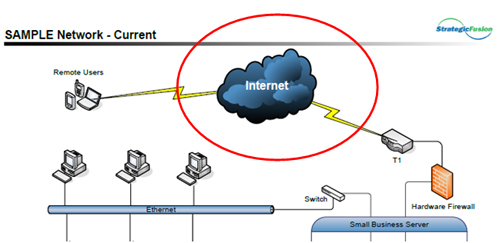
by Mike Gonsalves, StrateticFusion
Who can forget the 60's hit Get off my Cloud by the Rolling Stones? If this was written today by any of the tens of thousands of Cloud providers, they would be singing PLEASE get on MY Cloud. Cloud computing is about as hot as things get in IT. When you combine it with the other super hot technology, Virtualization, you get a Perfect Storm scenario, where we the people (the ones who use computing every day to make a living) ultimately win.
There is no doubt that the Cloud concept along with Virtualization are the two biggest items in IT right now; and rightfully so. Done correctly, either of these technologies can save a company money, sometimes lots and lots of money. Who could argue with that, given the American business mantra of do more with less?
So let me give you a quick overview on Cloud computing. First let me define the Cloud. We have all seen pictures of networks and how they work, usually when you are accessing anything beyond your Local Area Network (LAN) you head into the Cloud, the Cloud represents the internet. Here's an example circled in red:

What's inside the Cloud? Anything that has to do with data, originally it was mostly moving data from one place to another, but today, data can stop along the way and get altered in some fashion and then passed on.
Now, you could argue that the Cloud replaces the Black Box of old, although usually what goes into a Black Box, comes out quite differently on the other end, that is not always true with Cloud computing.
Where this argument holds even more water is when we look at the fact that your application may be in the Cloud. So data going in might be very different from data coming out. Nevertheless, Cloud computing is here to stay. Odds are that you will have some private or non-Cloud data on your desktop computer and some data in the Cloud, these will combine to offer you a unique computing experience on your desktop. However there are some Cloud providers, Google comes to mind, that would rather you have a simple thin client computer (not really a lot of horsepower or storage) as your desktop and that the Cloud does most of the work . . . hmmm . . . that is eerily reminiscent of the 1960's mainframe era when we used dumb terminals and the guys in the "glass house" ran the show on their mainframe computers. Of course we then had the PC revolution started, or at least accelerated and dominated, by our friends at Apple and Microsoft. We the people (Users of technology) wanted to take the power back from the old time "Cloud" and we did a good job of it. Are we ready to let it go again? I feel you could argue this either way, and I'm sure if anyone at Google has read this far, they are thinking NO, this guy doesn't get it! Well to a degree maybe. The Cloud today allows a lot of personal customization, this is due to the sheer horsepower contained in the Cloud and the ability to slice up the processing of information (Think Virtualization) to ensure your stuff and my stuff only meet when we want them to.
So how does this help you? The benefits of Cloud computing, especially for very small companies can be compelling. If you have less than 5 employees (most businesses in the US), putting your data (or most of your data) in the Cloud can make good business sense. It costs less than provisioning a server for your company, yet you get very tight security and you can access your data from anywhere.
What is the downside? If any part of the Cloud you are using goes down, you are stuck. What happens when someone cuts a wire while digging in front of your building? If you can't reach the Cloud, or your application provider goes down (it happens, more often than we would think) not much work gets done. What happens if hackers decide to focus on a giant pool of data, contained in the Cloud instead of trying to exploit each individual computer? These are questions we need to ask ourselves.
Do I use the Cloud? You bet, my email Spam filter is a Cloud based application and it is absolutely fantastic. Here is a case where we get economies of scale because SPAM effects everyone, having a Cloud based spam filter allows that provider to handle millions of emails a day and they can better control what is spam and what is not.